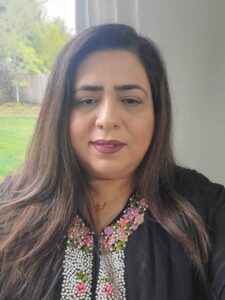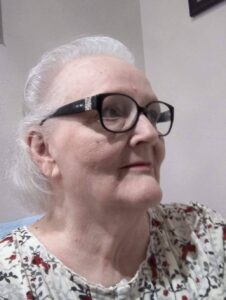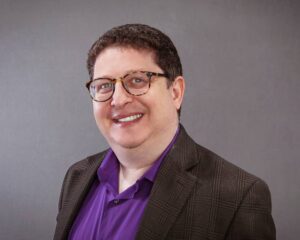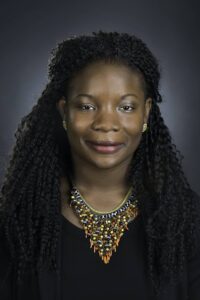Episode Description
Nearly 2.3 million care workers provide personal assistance and health care support to older adults and people with disabilities in their homes. This episode illuminates the relationship between Shazia Anwar, a professional home care worker in Washington state, and the woman she cares for, Darlen Wagenius. Shazia becomes an advocate for Darlen, and for all home care workers.
Shazia Anwar
 Shazia Anwar has been a professional home care provider for 12 years. She is also an active leader and Executive Board member in her union, SEIU 775. Her aim is to ensure that all care workers are lifted out of poverty, and have improved wages and benefits.
Shazia Anwar has been a professional home care provider for 12 years. She is also an active leader and Executive Board member in her union, SEIU 775. Her aim is to ensure that all care workers are lifted out of poverty, and have improved wages and benefits.
Darlen Wagenius
 Darlen Wagenius worked for over 30 years in a variety of professions, and the most recent was in the trucking industry. She currently lives at home, where Shazia Anwar is her caregiver.
Darlen Wagenius worked for over 30 years in a variety of professions, and the most recent was in the trucking industry. She currently lives at home, where Shazia Anwar is her caregiver. Adam Glickman (he/him)
SEIU 775 Secretary-Treasurer
 A lifelong advocate for workers’ rights and one of the first employees of SEIU 775, Adam helped run the breakthrough ballot measure in 2000 that gave state-paid Individual Provider home care workers the right to form our Union. After working in a variety of roles at the Union, he was elected first as Vice President and now as Secretary-Treasurer. Adam oversees the Public Affairs work of the Union – including government and community relations and political engagement – as well as the Legal program and the budget and finances of the Union.
A lifelong advocate for workers’ rights and one of the first employees of SEIU 775, Adam helped run the breakthrough ballot measure in 2000 that gave state-paid Individual Provider home care workers the right to form our Union. After working in a variety of roles at the Union, he was elected first as Vice President and now as Secretary-Treasurer. Adam oversees the Public Affairs work of the Union – including government and community relations and political engagement – as well as the Legal program and the budget and finances of the Union.
As the chief negotiator for the Washington Individual Provider Home Care Contract, one of the most comprehensive and equitable caregiver contracts in the nation, Adam’s efforts have helped Washington state caregivers become the first in the nation to win a $15 an hour minimum wage (now heading to $17+) and the first-in-the-nation retirement benefit.
Adam has also played a key role in the formation and growth of a range of progressive organizations throughout Washington. He was a founding board member of Fuse Washington and the Win-Win Network (America Votes affiliate), and sits on the board of One America Votes, the largest immigrant rights political organization in the state.
Blog
Immigrant Social Networks and the Little-Known Story of African Immigrants Providing Solutions to the “Crisis of Care” in the US
by Fumilayo Showers, Assistant Professor of Sociology and Africana Studies, University of Connecticut
 We are experiencing a “crisis of care” in the US and in other wealthy nations throughout the world. There are several reasons for this crisis. The population of older people is increasing, and as people live longer, they have increased health needs. At the same time, the availability of family members as caregivers is declining; and the local supply of health care workers has failed to keep up with the increasing demands for care workers.
We are experiencing a “crisis of care” in the US and in other wealthy nations throughout the world. There are several reasons for this crisis. The population of older people is increasing, and as people live longer, they have increased health needs. At the same time, the availability of family members as caregivers is declining; and the local supply of health care workers has failed to keep up with the increasing demands for care workers.
Nation states like the Philippines and India, and recruitment firms that operate across national boundaries (and others) have stepped in to fill some of these gaps by recruiting doctors, nurses and other health care workers from abroad to fill local labor needs (Rodriguez, 2010). There has also been a significant influx of migrant care workers from these nations and from Latin American and Caribbean countries who perform paid domestic and care work once here (Hondagneu-Sotelo, 2007); (Parreñas, 2015).
Immigrants from Africa have joined this global migratory labor force as workers in nursing, home/elder care, and disability support. Many serve as “labor brokers” in the United States; that is, they channel workers from their own countries into health care work in the U.S. However, little is known about this unique group. And the function they play in hospitals, nursing homes, residential care homes, and private homes has been largely invisible.
My research focuses on West Africans who become care workers in the United States. Broadly, I investigate the terms under which they have entered the United States through legal channels and become absorbed into the United States labor market as health care workers after they migrate here. Here’s an example from my research:
Before coming to the U.S., Marcus had been a schoolteacher in Cameroon. He arrived here with aspirations to become a teacher. Instead, he encountered discrimination and racist attitudes because of his African accent. Discouraged by this experience, Marcus followed the advice of Cameroonian friends and acquaintances and decided to get trained as a nurse. He was also inspired by fellow Cameroonians who had opened successful home health care businesses.
For newly arrived West African professionals like Marcus who were displaced in the US labor market after migration, occupations in health care, especially in the professional sectors, seemed accessible, even if they entered at the lowest tiers to gain a foothold in the industry.
Unlike Marcus who was a working-aged professional when he migrated, younger women I interviewed were encouraged by their mothers or other female family members to train as nurses. Claudia, a young immigrant from Sierra Leone, had migrated to the United States as a young adult to pursue a bachelor’s degree in Business Administration. A year into her studies, an aunt convinced her to switch her studies to become a nurse. Like her aunt, Claudia believed she had better job prospects and more opportunities in nursing. She completed her nursing education in the early nineties, at a time when there were acute nursing shortages in the U.S., and she was quickly recruited to work in a hospital. When I interviewed her, she was working as a registered nurse in a health care provision facility owned by Sierra Leoneans. Claudia’s circumstances provide a great example of how West African “ethnic networks” provide support to newly arrived immigrants and continue to support women as their nursing – or other health-related – careers progress.
I learned that migrants already established in the United States often regale family members back home with tales of success in America, portraying America as the land where one can make it. Here’s one example: Fatima, a Sierra Leonean woman, told me that she knew about the US labor market even before she arrived, as she had heard stories about possible paid work in nursing homes or private duty jobs in elder care. When Fatima arrived, one of her aunts found her a job in the informal ‘gray’ market for care. She worked in the home of a white family caring for their elderly parent. Fatima’s experience demonstrates the importance of West African immigrant networks in supporting and even placing newly arrived immigrants in the labor market, thus providing one solution to the “crisis of care.”
Individuals within immigrant networks not only help one another find care-related jobs; they continue to support one another as they work in the care field. For independent care providers, immigrant networks of home care workers refer jobs to one another, share the care of an individual, and are back-up when one person is not able to work. While these networks are often the backbone in creating stable care for individuals, the poor pay and lack of health insurance, particularly in independent care jobs, must be addressed in public policy to ensure a stable workforce.
Resources
- Overview: Caregiving in the U.S.: 2020 Report, AARP
- Family caregiving:
- Economic Impact of Family Caregiving, in Families Caring for an Aging America, National Academies Press, 2016.
- 50 Million Americans are Unpaid Caregivers: We Need Help, by Kate Washington, New York Times, 2021.
- Caregiving can be costly, by Laura Skufca and Chuck Rainville, AARP, 2021
- The Caregiver Effect: When Love Meets Necessity, YouTube talk by Donna Thomson, 2019.
- The Structural Burden of Caregiving: Shared Challenges in the United States and Canada, Miles G. Taylor and Amélie Quesnel-Vallée, 2017.
- Home care workers
- Why Should We Care About Home Care Workers? By Justin Campos, Wagner Review, 2022.
- For Older Adults, Home Care Has Become Harder to Find, by Paula Span, NY Times, 2021.
- Public Investment in Home Healthcare in the United States During the COVID-19 Pandemic: A Win-Win Strategy by Lenore Palladino, 2021.
- Direct Care Workers in the United States, PHI National, 2021.
- Immigrants and the Direct Care Workforce, by Robert Espinoza, PHI National, 2017.
- Resources:
- How to Hire a Caregiver, AARP, 2021.
- Becoming a Paid Caregiver, Washington State
- Elder Care Locator, public service of the U.S. Administration on Aging
- The National Direct Care Workforce Resource Center
- Activist and advocacy organizations and legislation
- National Domestic Workers Alliance works for the respect, recognition, and rights for the nearly 2.5 million nannies, housecleaners, and home care workers who do the essential work of caring for our loved ones and our homes.
- Caring Across Generations, Nonprofit organization focused on care-related policy from child care to elder care. Advocacy organization that fights for policies that support elders’ ability to receive care in the home, and that support the home care workers who provide that care.
- Diverse Elders Coalition, The Diverse Elders Coalition (DEC) advocates for policies and programs that improve aging in our communities as racially and ethnically diverse people; American Indians and Alaska Natives; and lesbian, gay, bisexual and/or transgender people. DEC advocates for policies and programs that improve aging in our communities as racially and ethnically diverse people – including care/caregiving.
- Better Care Better Jobs Act (which is stalled in Congress), includes expansion of access to home, co-sponsored by Senator Bob Casey, Senator Ron Wydon, and others.
- Credit for Caring Act, bi-partisan bill introduced on 5/18/21, which would provide up to $5,000 federal tax credit for eligible working family caregiver.